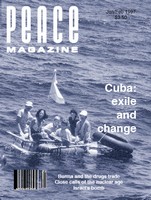
Peace Magazine Jan-Feb 1997, page 4. Some rights reserved.
Search for other articles by PMag staff here
You will read much in this issue about a single theme: the connections among justice, democracy, and peace. As Mona Rishmawi notes, justice is a precondition for genuine peace. For that reason Foreign Minister Axworthy is demanding that the new states in Bosnia hand accused war criminals over for trial. And for that reason, John Ralston Saul is demanding that Canada use its diplomatic and economic strength against the dictatorship in Burma.
Yet Saul supports the idea that there can be "benevolent dictatorships" and that democracy is merely one form of government among many. In contrast, there is an emerging world-wide consensus that democracy is a universal human right, though no perfect version of it exists. Justice requires that people have institutional means of choosing their own rulers, and that minorities have institutional means of protecting their own rights against those rulers. These are the ideals of democracy.
As Saul's cultural relativism suggests, though Canadians enjoy great democracy at home, they are not always prepared to defend it universally as a principle of justice. Thus the Canadian government officially overlooks governmental violations of human rights in China, Burma, Indonesia, and Cuba, arguing that Canada may be more effective using "constructive engagement" (i.e. lucrative trade) instead of economic pressure. By contrast, the European Union made expansion of ties with Cuba contingent on that country's improving its practices with respect to human rights and democracy. Canada alone refuses to make such a demand. Unlike Europeans, Canadians have never held Cuba accountable to the same standards of democracy as other countries. Indeed, Canadian public opinion is cordial to Cuba's government, which has never established its legitimacy by holding free elections.
A nonviolent democracy movement exists in Cuba. Like members of the Group for Trust Between East and West, Solidarity, or Charta 77 (peace and democracy activists during the last years of the Soviet empire) its members are persecuted; some have been imprisoned for 15 years. France's Human Rights Commission has recently honored a leader of this movement, Elizardo Sanchez Santa Cruz, who had been a philosophy professor before he began opposing Castro. Since then Sanchez has been jailed 10 times and is declared a "prisoner of conscience" by Amnesty International. Few Canadians know anything about his movement. To present a balanced analysis, we offer two articles about Cuba - one for this issue, and one for March - by Holly Ackerman, a rare journalist who can represent both sides of the debates.

Peace Magazine Jan-Feb 1997, page 4. Some rights reserved.
Search for other articles by PMag staff here